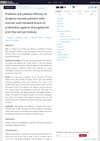 6 citations,
September 2014 in “Australasian Journal of Dermatology”
6 citations,
September 2014 in “Australasian Journal of Dermatology” Asylum seekers arriving by boat may face skin problems due to harsh conditions, and doctors should use a thorough skin assessment approach to diagnose and treat them effectively.
 5 citations,
May 2017 in “Journal of the European Academy of Dermatology and Venereology”
5 citations,
May 2017 in “Journal of the European Academy of Dermatology and Venereology” The study found no significant difference in stress hormone levels between people with alopecia areata and healthy individuals, suggesting that the disease is not caused by an overactive stress response system.
 4 citations,
January 2016 in “Postepy Dermatologii I Alergologii”
4 citations,
January 2016 in “Postepy Dermatologii I Alergologii” Many hair diseases, including those caused by medications and psychological issues, can lead to hair loss and require proper treatment and specialist care.
 2 citations,
January 2023 in “Journal of Education, Health and Sport”
2 citations,
January 2023 in “Journal of Education, Health and Sport” Cognitive-behavioral therapy with habit reversal training is the most effective treatment for trichotillomania.
 2 citations,
February 2017 in “International Journal of Molecular Sciences”
2 citations,
February 2017 in “International Journal of Molecular Sciences” Erdr1 could be a new marker for diagnosing hair loss.
 2 citations,
February 2014 in “Hair therapy & transplantation”
2 citations,
February 2014 in “Hair therapy & transplantation” Alopecia Areata is an autoimmune condition causing hair loss, influenced by genetics, environment, and possibly improved by anti-MIF therapy, with many patients experiencing regrowth within a year.
 1 citations,
October 2023 in “Dermatology and therapy”
1 citations,
October 2023 in “Dermatology and therapy” Some treatments for severe hair loss work but often have side effects, with baricitinib showing the most promise.
 November 2023 in “Scholars academic journal of biosciences”
November 2023 in “Scholars academic journal of biosciences” Trichotillomania can cause severe complications like hairballs in the stomach, needing surgery and psychiatric care.
 July 2022 in “International journal of dermatology, venereology and leprosy sciences”
July 2022 in “International journal of dermatology, venereology and leprosy sciences” More frequent and severe skin problems are linked to higher daily alcohol consumption.

The document concludes that diagnosing female hair loss requires careful examination, with treatments varying by condition and psychological support often necessary.
7 citations,
March 2022 in “Journal of the American Academy of Dermatology” Stress can trigger or worsen alopecia areata.
 January 2025 in “Journal of Cosmetic Dermatology”
January 2025 in “Journal of Cosmetic Dermatology” Poor nutrition, higher BMI, and stress may worsen seborrheic dermatitis.
 February 2024 in “Folia Medica”
February 2024 in “Folia Medica” Platelet-rich plasma treatment is effective for hair loss in patients regardless of their thyroid antibody levels.
16 citations,
January 2022 in “International journal of molecular sciences” Certain daily habits like stress, diet, and sleep can affect the severity of hair loss in alopecia areata.
9 citations,
May 2019 in “Medicine” The C-allele and CC-genotype in the PTPN22 gene lower the risk of alopecia areata.
3 citations,
July 2023 in “International journal of molecular sciences” Stress may contribute to hair loss in alopecia areata by affecting immune responses and cell death in hair follicles.
 1 citations,
January 2022 in “Turkiye Klinikleri Journal of Dermatology”
1 citations,
January 2022 in “Turkiye Klinikleri Journal of Dermatology” Lifestyle changes during the early COVID-19 outbreak led to more cases of acne and other skin conditions, but fewer cases of rosacea and skin infections.
 July 2023 in “IntechOpen eBooks”
July 2023 in “IntechOpen eBooks” New treatments for alopecia areata show promise, but more research is needed to confirm their effectiveness.













